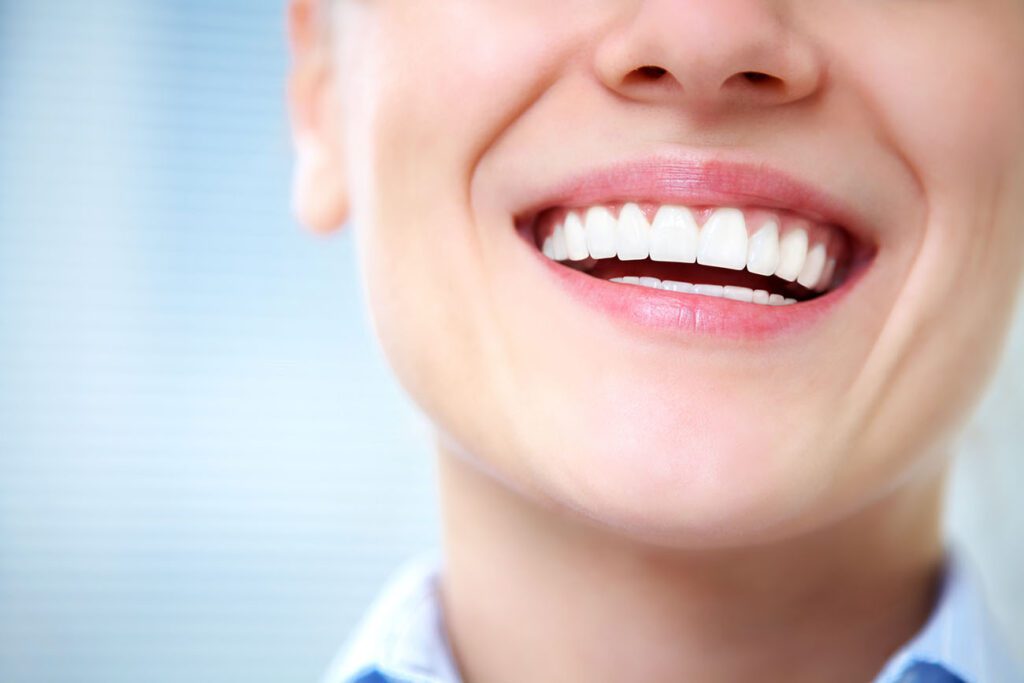Teeth whitening at the dentist removes stains from the tooth’s surface. We provide in-office and take-home teeth whitening options, as well as power bleaching.
Teeth whitening is a cosmetic dental treatment that enhances the appearance of teeth, helping you achieve a more confident smile.
Dr. Abazid offers professional teeth whitening in San Antonio, ensuring that your smile looks its best.
Teeth whitening removes the effects of coffee, cigarettes, and other substances that can permanently stain or discolor teeth.
Aging, certain medications, and excessive fluoride may also cause tooth stains. However, whitening treatments cannot remove all stains.
Whatever the cause of your tooth discoloration, we will customize the treatment to meet your needs.

Most Common Teeth Whitening Treatments
When it comes to whitening your teeth, there are several options available to suit different needs:
- In-Office Whitening: A professional procedure where a dentist uses stronger whitening agents under controlled conditions for immediate results. This is ideal for those seeking quick and noticeable improvements.
- Take-Home Kits: A more gradual approach, where you use a custom-made tray and whitening gel at home. This method is less expensive and can be more convenient for those with busy schedules.
- Power Bleaching: This method uses higher concentrations of whitening gel activated by a special light to speed up the whitening process. It is best suited for patients with strong tooth enamel who are looking for immediate results.
What Causes Tooth Stains?
There are several reasons why your teeth may become discolored, darkened, or yellowed. Here are the common causes of tooth stains:
- Tooth Damage: A chipped or broken tooth may turn gray due to the blood vessels within it. Blood flow decreases to the tooth after injury, which can cause it to darken.
- Foods and Drinks: Coffee, tea, wine, berries, and other foods and drinks contain chromogens, which are chemical compounds that can stain teeth. Even with regular brushing and flossing, these substances can cause staining.
- Medications: Certain medications, like antihistamines, antipsychotics, and others, may increase the risk of tooth stains.
- Aging: Over time, the tooth enamel, or outer layer, can wear down, exposing the darker dentin underneath. This natural wear can lead to discoloration.
- Fluorosis: An excess of fluoride during tooth development can create white or brown spots on the teeth. Although these spots are harmless, they can affect the aesthetic of your smile.
- Tobacco Use: Smoking cigarettes or using tobacco products can quickly stain teeth due to the nicotine and tar. These substances are known to cause yellowing and other discolorations.
Types of Tooth Stains
The type of stain you have will determine the treatment approach. We address two common types of tooth stains:
- Intrinsic Stains: These stains occur within the tooth and are harder to remove. They are often caused by tooth damage, aging, or certain medications. Intrinsic stains may not respond well to professional whitening treatments.
- Extrinsic Stains: These stains appear on the outer surface of the tooth and are often caused by foods, drinks, or tobacco use. Extrinsic stains generally respond well to whitening treatments, including in-office and take-home whitening options.
Our office may recommend different whitening treatments based on the type of stains present. For intrinsic stains, we may recommend alternative cosmetic treatments like veneers, as whitening may not be effective.
Teeth Whitening in San Antonio, TX
Over-the-counter whitening products such as gels, strips, and toothpaste often fail to provide lasting results. These treatments may also offer inconsistent results and cause increased tooth sensitivity.
Professional teeth whitening services at our office can provide better, longer-lasting results. Our whitening services are customized to ensure the best outcome for each patient.
In-Office Whitening
Power bleaching uses higher concentrations of hydrogen peroxide than other treatments. During this procedure, we apply the whitening gel to the teeth and activate it using a light to speed up the whitening process. This method is effective for patients without sensitive teeth who are seeking fast results.
For those with sensitive teeth, we do not recommend power bleaching. We will discuss the best option for your specific needs to ensure your treatment is comfortable and effective.
Take-Home Whitening Kits
If you prefer whitening your teeth at home, we offer take-home whitening kits. We will first take molds of your teeth to create a custom tray that fits perfectly. Once your tray is ready, we’ll provide whitening gel and detailed instructions on how to use it for optimal results.
Take-home whitening kits are a great option for those looking for a more gradual but effective solution. We will also provide guidance based on the severity of your tooth staining and sensitivity.
Maintaining Your Results
To maintain the brightness of your teeth after whitening treatment, avoid coffee, tea, and other beverages that can discolor your teeth. Brushing and flossing twice a day will help to remove surface stains and keep your smile looking bright. Our office can also provide touch-up treatments six to twelve months after your initial treatment to help maintain your results.
Is Teeth Whitening Right for Me?
It’s important to remember that teeth whitening is not suitable for everyone. Before undergoing any treatment, we recommend a dental exam to assess the health of your teeth and gums. Dr. Abazid will suggest the best whitening option based on your needs.
We typically recommend whitening for yellow or gray teeth, but it may not be effective for some stain colors. Whitening may not work for patients with gum disease, receding gums, or severe tooth sensitivity. In these cases, Dr. Abazid may recommend alternative treatments.
Alternatives to Teeth Whitening
For patients with sensitive teeth or deep stains that don’t respond to whitening treatments, we offer other cosmetic and restorative dental options. Porcelain veneers can be used to cover discolored teeth, providing a long-lasting and aesthetically pleasing solution. Dental crowns are also effective for patients with tooth damage and staining.
Frequently Asked Questions
Here are some of the most common questions related to teeth whitening:
- What foods and drinks should I avoid to maintain my whitening results?
Avoid dark-colored drinks such as coffee, tea, and red wine, as well as foods like berries and soy sauce. Smoking and tobacco products can also stain teeth. After whitening, your teeth will be more porous, so it’s best to be cautious for 48 hours. - Are there any medical conditions that prevent me from whitening my teeth?
If you have gum disease, tooth decay, or exposed tooth roots, whitening may not be safe for you. People with severe enamel erosion or hypersensitivity should avoid whitening. - How do I know if my stains are internal or external?
External stains are surface stains caused by food, drinks, or smoking. Intrinsic stains are deeper and caused by factors like trauma, medication, or fluorosis. Your dentist can determine which type you have and recommend the most appropriate treatment. - How long do professional teeth whitening results last?
The results of professional whitening can last between six months to two years, depending on your habits. Regular cleanings and avoiding staining foods and drinks will help maintain your results. - Is teeth whitening safe for people with dental restorations?
Whitening will not change the color of crowns, veneers, or fillings. Only natural teeth will lighten, which can create an uneven color. Your dentist may suggest replacing old restorations after whitening to match the new shade. - Can I whiten my teeth while pregnant or breastfeeding?
It’s best to wait until after pregnancy or breastfeeding to undergo teeth whitening, as there is insufficient research to confirm its safety during these periods. - Will whitening treatment make my teeth sensitive?
Some people experience temporary sensitivity, especially with stronger treatments. This usually subsides within a few days. If you have a history of sensitive teeth, let your dentist know so they can recommend the best approach.
Brighten Your Smile Today
Erase years of tooth stains with professional teeth whitening services. Call our office in San Antonio at 726-222-3293 to schedule a consultation. You can also book an appointment online for your convenience.
Our office proudly serves the Apple Creek, Alamo Farmsteads, Oak Hills, and Leon Valley communities.
